
Product test
A lot of power for little money: the Deltaco DK470 tested
by Kevin Hofer

I may be a keyboard snob, but I can certainly appreciate a decent budget version. Unfortunately, the Glorious GMBK 75% doesn’t make the cut.
It’s dislike at first sight. The GMBK 75% is cheaply made, sports a shoddy-looking rotary knob and the back’s plastered with Glorious logos. When my fingers first touch the keys, I feel a distinct urge to chuck the keyboard right back into its box.
But I force myself to bite the bullet and try out the keyboard for work and gaming.
Sitting in front of the GMBK 75%, I’m reminded of all the latest Glorious keyboards. Like the GMMK Pro, it’s essentially a box on a wedge with rounded corners. On the sides, there are light diffusers for RGB lighting. There’s also a clearly visible gap where the top and bottom parts of the keyboard meet.
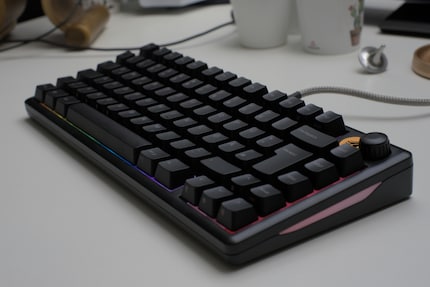
The thing that immediately stands out about the keyboard is its poor build quality. It makes a big old creaking noise when I set it on the desk for the first time. If that weren’t bad enough, it doesn’t lie flat, so it rocks this way and that as I’m typing. The plastic surfaces don’t seem to be coated either. Fingerprints show up as soon as I get my hands on the keyboard. The fact that it weighs just 540 grammes reinforces that sense of cheapness. By contrast, my other plastic keyboards tip the scales around the one-kilo mark.
All that being said, I do manage to take something positive from the keyboard’s appearance. Glorious has fitted it with a removable USB-C cable for connecting to a computer – a feature you see on very few budget keyboards. The benefit of this? It eliminates the possibility of the device becoming a single point of failure.
Fingerprints on housing are one thing, but fingerprints on keycaps are a different kettle of fish. These soon start showing up, making the keyboard look grubby after just a day of use. Hardly surprising, given Glorious has gone for keycaps made of ABS plastic. Though cheap to produce, the material’s notoriously reactive to finger grease.
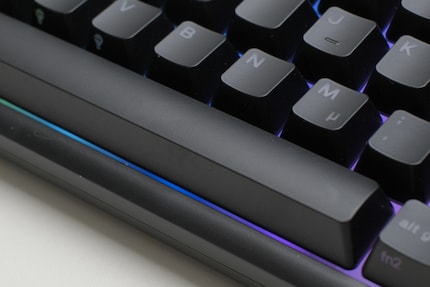
True to gaming keyboard form, the GMBK 75% has RGB lighting. When I connect it for the first time, I’m blinded by a flood of rainbow colours. Thanks to membrane switch technology, a continuous stream of light comes up from under keycaps, and not just under each individual switch. Personally, I’m not too keen on this light show, but I do appreciate it as a backlight for the keys in the dark. Unfortunately, the light shining through the keycaps is really faint. Yet another example of where Glorious has cut corners.
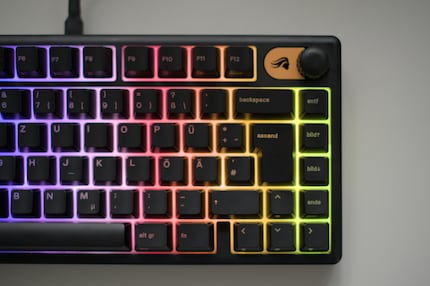
On the bright side, at least you can swap out the keycaps. You have the option to use MX-compatible caps, i.e. caps usually also used on mechanical keyboards. This opens up a world of customisations available from Glorious and third-party manufacturers. The thing is, I doubt people who’d buy a budget keyboard would be willing to fork out extra for keycaps. After all, they can easily cost half the price of the keyboard or more. Nice keycaps are great, but they don’t change your typing experience in a fundamental way. And that’s precisely where the GMBK 75% goes wrong.
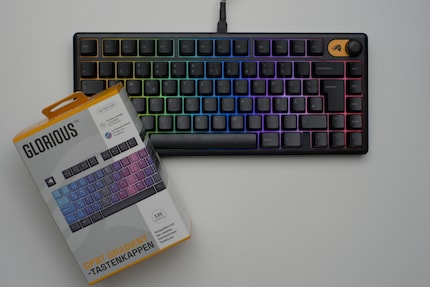
Let me put it this way: membrane switches are the devil incarnate. Typing on them feels imprecise. Rather than feeling good, the switches feel the way you’d expect from their production costs: cheap.
Membrane keypads consist of thin plastic membranes with exposed electrical wires. There are usually three membranes, the bottom of which is connected to the circuit board with wires running vertically. The top membrane, which is laterally connected to the bottom one, has horizontal wires, allowing a circuit to be formed. A separating layer between these two membranes prevents the circuit from being closed accidentally. Contact’s only established when you press the keys.
That’s also why the keys don’t feel good to type on. At the end of the day, you’re just typing on rubber. They’re are also considered less precise and durable than mechanical switches. If a key stops working, you can’t replace it. Rubber also ends up wearing out eventually.
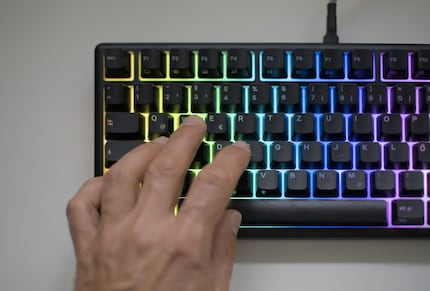
One advantage of membrane keyboards is that they’re generally quieter than mechanical ones. However, that’s not the case for the GMBK 75%. It rattles and clatters louder than any of my mechanical keyboards, but unlike them, it doesn’t sound good.
Since they’re made with fewer cracks, membrane keyboards are also better protected against liquids and dust than mechanical ones. Glorious advertises its keyboard as IP57-certified, meaning it’s dust-proof and protected against immersion in water. Not bad.
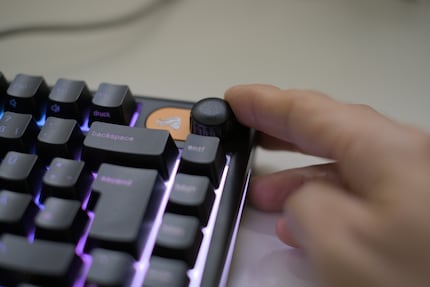
The rotary knob, another unusual feature for a budget keyboard, doesn’t impress me either. Not only does it look cheaply made, but it’s also difficult to turn. When I’m using it, I sometimes accidentally cause the keyboard to slip.
Everything I’ve just said about typing on the keyboard applies to gaming too. The device just doesn’t feel good. I have a sense that my keystrokes don’t trigger evenly. Still, at least the keyboard seems to have N-key rollover. This means you can press several keys at once without their inputs being missed.
With a polling rate of 1,000 hertz, the keyboard communicates quickly enough with a PC for most gamers. If you want to configure the GMBK 75%, you have to use Glorious’s Core software. Although the program boasts all the settings you might need, it’s been buggy for me on previous test devices. This basically means that some of my settings aren’t applied. On some occasions, I can’t actually modify the settings at all.
I’ll keep this brief. If you need a budget gaming keyboard, don’t buy the Glorious GMBK 75%. Everything about it – from the build quality to the membrane switches to the typing experience to the sound – is a total letdown.
Personally, I’d never advise anyone to buy a keyboard in the price range of the GMBK 75%. Let’s face it, if you buy cheap, you buy twice. You’ll find decent, fairly inexpensive keyboards in Keychron’s V and K series. Yes, they’re double the price, but trust me: unlike the GMBK 75%, they’re worth it.
Pro
Contra
From big data to big brother, Cyborgs to Sci-Fi. All aspects of technology and society fascinate me.